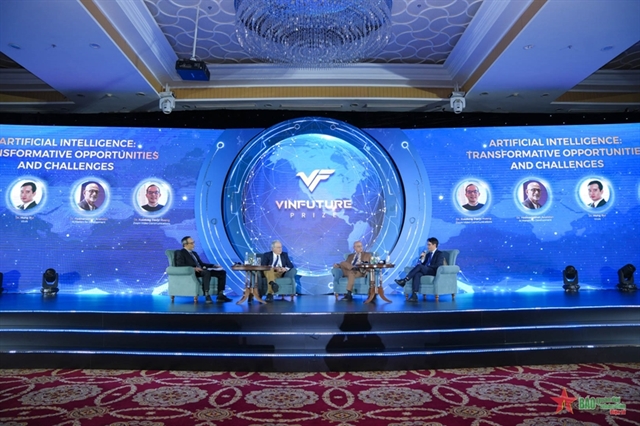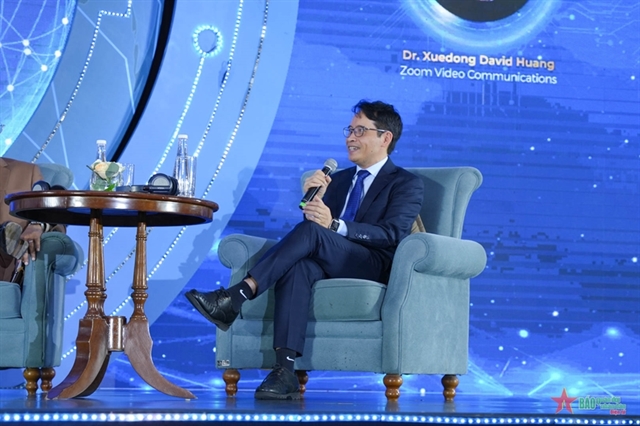 Economy
Economy


|
| Panelists at the symposium "Artificial Intelligence: Transformative Opportunities and Challenges" on December 19 in Hà Nội. — Photo courtesy of VinFuture organiser |
HÀ NỘI — Taking advantage of Artificial Intelligence (AI) technology potential responsibly and sustainably was the main topic of discussion at a symposium in Hà Nội on December 19.
The symposium, entitled "Artificial Intelligence: Transformative Opportunities and Challenges" is part of the VinFuture Science and Technology Week 2023 organised by the VinFuture Foundation.
Participants heard that advances in AI research have opened up incredible prospects for economic growth. Companies and research organisations can leverage the computing power of AI to boost productivity and reduce research time. As a result, production costs are reduced; innovation capabilities are enhanced, helping to create an interesting and competitive working environment, saving human effort in traditional tasks.
Dr. Xuedong Huang, a member of the VinFuture Award Council and Chief Technology Officer of Zoom Group, US, presented how AI tools will impact the job market, increase labour productivity and transform the way humans and computers connect.
Dr. Huang said that now was a historic moment, global productivity from AI applications will increase much faster than previous scientific and technological revolutions. “I believe this is a breakthrough opportunity to change history. No matter where you are or what country you are in, there is potential. If we grasp this opportunity, whether we are individuals, small or large businesses, we all have the opportunity to innovate."
Prof. Leslie Gabriel Valiant, member of the VinFuture Prize Council and at T. Jefferson Coolidge Professor of Computer Science and Applied Mathematics at Harvard University, US, said that AI is an opportunity to create equality for all. AI can be applied in teaching and training machines according to human needs.
“AI is a powerful technology like nuclear physics chemistry, both used for good and bad purposes. It is simply technology. The important issue is ensuring AI safety, and ensuring AI is used for good purposes. To do so, we must control production, discuss responsible AI applications, and join hands to reduce risks," said Pro. Valiant.

|
| Dr. Bùi Hải Hưng, Founder and Chief Executive Officer of VinAI speaks at the symposium. |
Dr. Bùi Hải Hưng, Founder and Chief Executive Officer of VinAI, Viet Nam, said: “Even those who research and create the most popular AI applications globally did not expect the rapid development of AI to that extent. This is the time we need to be more serious in the research and application of AI. AI is no longer a dream."
“Vietnamese young people caught up with these trends very quickly. However, not only learning technology, Việt Nam's team of technologically talented engineers has grasped core technology and developed it into separate applications. Typically, there are large language models for Vietnamese such as PhoGPT or some other Vietnamese language models. This is proof that Việt Nam's intellectual team has quickly caught up with the world in this race,” stressed Hưng.
Scientists also believe that, in fact, AI is posing major challenges in ethics, security and equality of access, especially as AI's capabilities become greater. Challenges can come from AI's power being used for bad purposes, AI making incomplete decisions in ethical dilemmas or control of AI's vast capabilities residing in the hands of a minority group.
Dr. Huang explained that AI is only trained and built with data. If the data you collect is skewed, it will be reflected in the final results and the decision will also be skewed.
“And of course, the AI model itself is not perfect. So we need to develop a screening layer to ensure that the content output from AI meets community standards," added Dr. Huang.
On the same day, world-leading experts also discussed green transportation and energy use at a symposium on sustainable infrastructure and green transportation.
Scientists also identified challenges in implementing sustainable infrastructure projects and traffic development. Green and energy transition are not only related to technological solutions but also depend on green development policies and efforts in the world and each country. Scientists believe that to achieve the goal of sustainable development, cooperation between all parties is needed to remove barriers and build a sustainable future based on global cooperation.
Taking place right after the 28th annual United Nations Climate Conference (COP28), the event is an opportunity for the world's leading researchers to discuss efforts to effectively use green energy, as well as urgent actions to reduce emissions and accelerate the fight against global climate change. — VNS